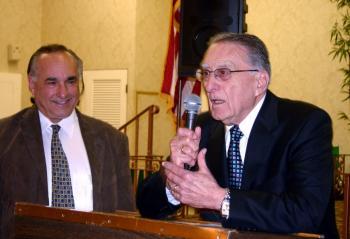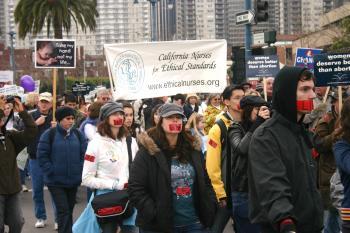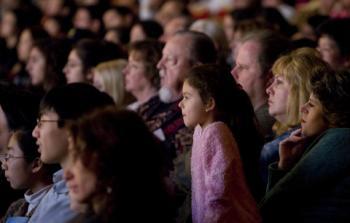ALVISO, Calif.—The lifetime chance of dying from cancer is one in five for Hispanic men and about one in six for Hispanic women, according to the American Cancer Society’s Cancer Facts & Figures for Hispanics/Latinos 2009–2011. The same publication cited cancer as the second leading cause of death among Hispanics, accounting for 20 percent of deaths overall and 13 percent of deaths in children.
The day before Mother’s Day, hundreds of Bay Area walkers gathered at Alviso Marina County Park for the seventh annual Mother’s Day Walk Against Cancer.
Among hundreds of participants were two dozen walkers dressed in pink T-shirts imprinted with: “In loving memory of Rosa Cisneros 1959–1998”. The group, consisting of family members and relatives, has joined the walk since its inception in 2005.
Cisneros, a lively woman who worked in the semiconductor industry, had battled against breast cancer, the leading killer of Latinas, for seven years before passing away. She was survived by her husband and three sons.
Raising awareness is what has brought the group out to the walk year after year, said niece Linda Beltran after returning from a three-mile-long walk. “A lot of the times they find out too late when they have breast cancer. … We want our girls to know that if they do their checkups and annuals regularly ... they can prevent cancer.”
This year’s Mother’s Day’s Walk, organized by Latinas Contra Cancer, focused on colon cancer, the second deadliest cancer in the Latino community.
The message of the day is awareness, said Janet Hudson of Prevent Cancer Foundation, which has been advocating for awareness of preventable cancers for the past 25 years.
While giving a tour inside the super colon, a giant-sized inflatable model she brought from Virginia, Hudson says she knows men and women in their 20s who have developed stage I or stage II colon cancer.
“But the important thing to remember is that it is a preventable disease—90 percent preventable,” she said. “And not only is it 90 percent preventable, but when you find it in the early stages, it is 100 percent treatable.”
Putting the emphasis on family, she hopes mothers will learn the message that they have the power to prevent it. “Your children do not have to get this disease,” Hudson said.
Just how do you prevent colon cancer? Exercise, eat a healthy diet, have a colonoscopy, and limit alcohol and tobacco intake, according to Hudson.
“Sixty percent of colon cancer deaths don’t have to happen,” said Ysabel Duron, cancer survivor and founder and executive director of Latinas Contra Cancer. “One of the reasons why we focused on colon cancer this year in the Latino community is because they only have about a 40 percent screening rate.”
While the walk had taken place in San Jose in previous years, it moved to Alviso, an underserved community, this year, in an attempt to reach people there.
“What we are trying to do is to reach people where they live, where they work, where they worship, in an attempt to raise that awareness—to go to them so that they don’t feel they have to necessarily leave their neighborhood,” said Duron.
Language barriers, social beliefs, and cultural practices are among those difficulties that make access to services difficult and diminish survival rate in the underdiagnosed and underserved communities.
“I’m a cancer survivor, and having had the experience I wondered a lot—particularly about the … under served Latinos,” said the former Bay Area television anchor and award-winning journalist.
Founded in 2003, Latinas Contra Cancer is a nonprofit that seeks to increase cancer awareness and decrease mortality in the Latino community through education, navigation, and support of the underserved Latino population.
The day before Mother’s Day, hundreds of Bay Area walkers gathered at Alviso Marina County Park for the seventh annual Mother’s Day Walk Against Cancer.
Among hundreds of participants were two dozen walkers dressed in pink T-shirts imprinted with: “In loving memory of Rosa Cisneros 1959–1998”. The group, consisting of family members and relatives, has joined the walk since its inception in 2005.
Cisneros, a lively woman who worked in the semiconductor industry, had battled against breast cancer, the leading killer of Latinas, for seven years before passing away. She was survived by her husband and three sons.
Raising awareness is what has brought the group out to the walk year after year, said niece Linda Beltran after returning from a three-mile-long walk. “A lot of the times they find out too late when they have breast cancer. … We want our girls to know that if they do their checkups and annuals regularly ... they can prevent cancer.”
This year’s Mother’s Day’s Walk, organized by Latinas Contra Cancer, focused on colon cancer, the second deadliest cancer in the Latino community.
The message of the day is awareness, said Janet Hudson of Prevent Cancer Foundation, which has been advocating for awareness of preventable cancers for the past 25 years.
While giving a tour inside the super colon, a giant-sized inflatable model she brought from Virginia, Hudson says she knows men and women in their 20s who have developed stage I or stage II colon cancer.
“But the important thing to remember is that it is a preventable disease—90 percent preventable,” she said. “And not only is it 90 percent preventable, but when you find it in the early stages, it is 100 percent treatable.”
Putting the emphasis on family, she hopes mothers will learn the message that they have the power to prevent it. “Your children do not have to get this disease,” Hudson said.
Just how do you prevent colon cancer? Exercise, eat a healthy diet, have a colonoscopy, and limit alcohol and tobacco intake, according to Hudson.
“Sixty percent of colon cancer deaths don’t have to happen,” said Ysabel Duron, cancer survivor and founder and executive director of Latinas Contra Cancer. “One of the reasons why we focused on colon cancer this year in the Latino community is because they only have about a 40 percent screening rate.”
While the walk had taken place in San Jose in previous years, it moved to Alviso, an underserved community, this year, in an attempt to reach people there.
“What we are trying to do is to reach people where they live, where they work, where they worship, in an attempt to raise that awareness—to go to them so that they don’t feel they have to necessarily leave their neighborhood,” said Duron.
Language barriers, social beliefs, and cultural practices are among those difficulties that make access to services difficult and diminish survival rate in the underdiagnosed and underserved communities.
“I’m a cancer survivor, and having had the experience I wondered a lot—particularly about the … under served Latinos,” said the former Bay Area television anchor and award-winning journalist.
Founded in 2003, Latinas Contra Cancer is a nonprofit that seeks to increase cancer awareness and decrease mortality in the Latino community through education, navigation, and support of the underserved Latino population.



